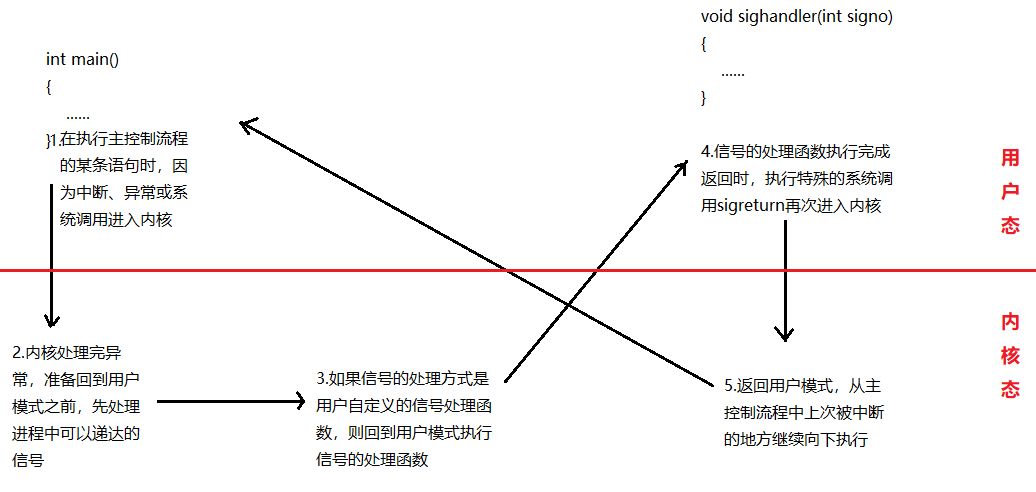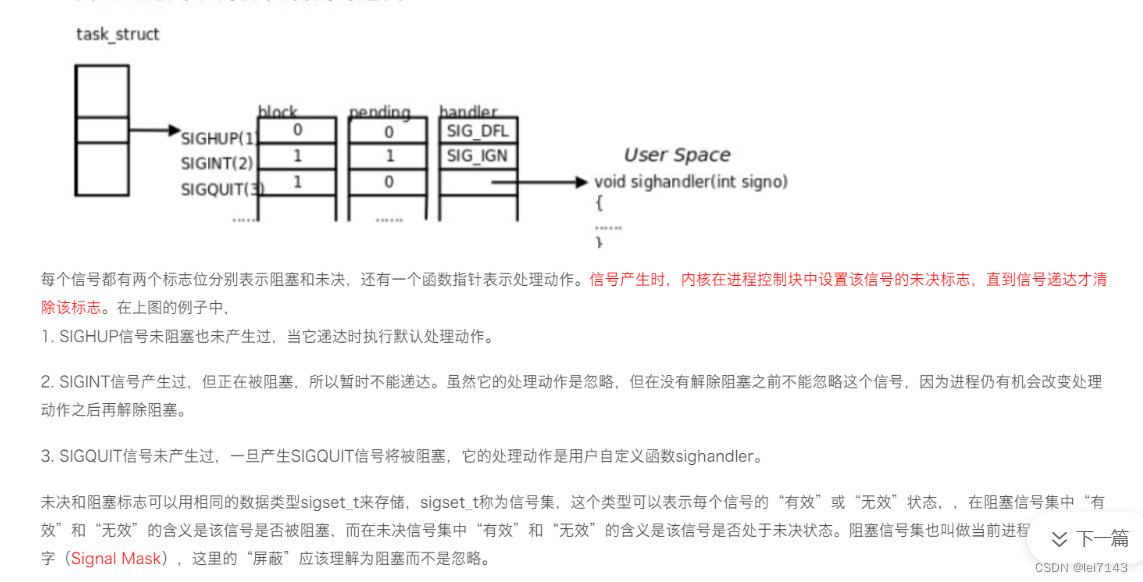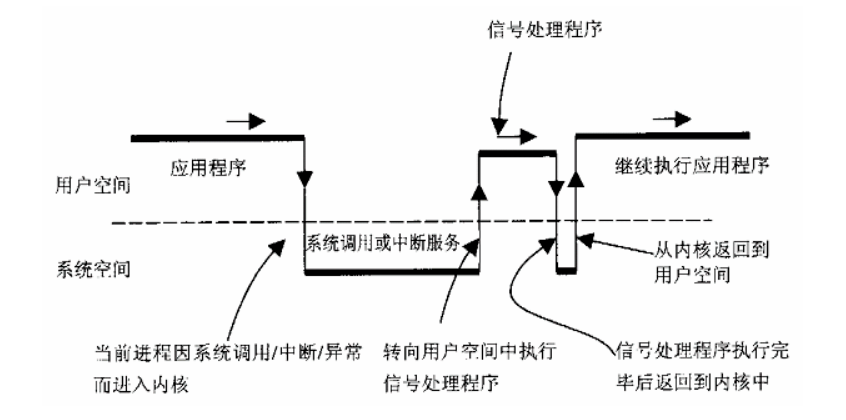Bionic 简介_zhengyad123的博客-CSDN博客_bionic linux
Bionic库是Android的基础库之一,也是连接Android系统和Linux系统内核的桥梁。
bionic/libc/platform/bionic/reserved_signals.h
33 #include <signal.h>
34
35 #include "macros.h"
36
37 // Realtime signals reserved for internal use:
38 // 32 (__SIGRTMIN + 0) POSIX timers
39 // 33 (__SIGRTMIN + 1) libbacktrace
40 // 34 (__SIGRTMIN + 2) libcore
41 // 35 (__SIGRTMIN + 3) debuggerd
42 // 36 (__SIGRTMIN + 4) platform profilers (heapprofd, traced_perf)
43 // 37 (__SIGRTMIN + 5) coverage (libprofile-extras)
44 // 38 (__SIGRTMIN + 6) heapprofd ART managed heap dumps
45 // 39 (__SIGRTMIN + 7) fdtrack
46 // 40 (__SIGRTMIN + 8) android_run_on_all_threads (bionic/pthread_internal.cpp)
47
48 #define BIONIC_SIGNAL_POSIX_TIMERS (__SIGRTMIN + 0)
49 #define BIONIC_SIGNAL_BACKTRACE (__SIGRTMIN + 1)
50 #define BIONIC_SIGNAL_DEBUGGER (__SIGRTMIN + 3)
51 #define BIONIC_SIGNAL_PROFILER (__SIGRTMIN + 4)
52 #define BIONIC_SIGNAL_ART_PROFILER (__SIGRTMIN + 6)
53 #define BIONIC_SIGNAL_FDTRACK (__SIGRTMIN + 7)
54 #define BIONIC_SIGNAL_RUN_ON_ALL_THREADS (__SIGRTMIN + 8)
55
栈的回溯又分为两种:APCS(ARM Procedure Call Standard)与unwind。
arm上backtrace的分析与实现原理 - 腾讯云开发者社区-腾讯云
system/unwinding/libbacktrace/BacktraceCurrent.h
20 #include <stdint.h>
21 #include <sys/types.h>
22
23 #include <backtrace/Backtrace.h>
24
25 // The signal used to cause a thread to dump the stack.
26 #if defined(__GLIBC__)
27 // In order to run the backtrace_tests on the host, we can't use
28 // the internal real time signals used by GLIBC. To avoid this,
29 // use SIGRTMIN for the signal to dump the stack.
30 #define THREAD_SIGNAL SIGRTMIN
31 #else
32 #define THREAD_SIGNAL (__SIGRTMIN+1)
33 #endif
34
#define SIGRTMIN (__libc_current_sigrtmin())
int __libc_current_sigrtmin() {
34 return __SIGRTMIN + __SIGRT_RESERVED;
35 }
bionic 库中__SIGRTMIN 为32 ,预留实时信号数为 __SIGRT_RESERVED ,所以 SIGRTMIN 为41
android native 层可以通过ProcessCallStack
ProcessCallStack pcs;
pcs.update();
pcs.dump(fd);
再通过 system/unwinding/libbacktrace/Backtrace.cpp 里面通过 UnwindStackCurrent 获取,是通过发送 THREAD_SIGNAL 信号给到进程获取
android java 层通过Thread.getStackTrace 获取,最终
art/runtime/thread.cc 中 Thread::CreateInternalStackTrace 获取
art 里面进程创建:
https://www.jianshu.com/p/00793196ed37
java 层对应的是 Thread (java_peer) ,对应 native 层 thread.cc (child_thread),最终pthread_create 创建线程,内核调用clone ,art 使用 child_thread 表示线程,java 层使用java_peer表示,内核创建对应的是 new_pthread 。
void Thread::CreateNativeThread(JNIEnv* env, jobject java_peer, size_t stack_size, bool is_daemon) {
...
Thread* child_thread = new Thread(is_daemon);
pthread_t new_pthread;
pthread_create_result = pthread_create(&new_pthread,
&attr,
Thread::CreateCallback,
child_thread);
}
linux 信号处理



线程会有自己的悬挂信号队列, 并且线程组也有一个信号悬挂队列

在内核返回用户空间前一刻,内核都会检查信号队列,有信号会发起信号队列处理,主要流程如上
核心函数do_notify_resume() -> do_signal() ->handle_signal 处理用户注册的处理函数。
当然在回到用户空间处理时,需要修改调用栈,在用户空间注册函数执行完,调用sigreturn 系统调用,需要恢复到处理信号函数之前的堆栈,从而可以
kernel-4.19/arch/arm64/kernel/signal.c
asmlinkage void do_notify_resume(struct pt_regs *regs,
909 unsigned long thread_flags){
...
if (thread_flags & _TIF_SIGPENDING)
934 do_signal(regs);
...
}
static void do_signal(struct pt_regs *regs){
if (get_signal(&ksig)) { //说明用户注册的信号出路函数信号
877 /*
878 * Depending on the signal settings, we may need to revert the
879 * decision to restart the system call, but skip this if a
880 * debugger has chosen to restart at a different PC.
881 */
882 if (regs->pc == restart_addr &&
883 (retval == -ERESTARTNOHAND ||
884 retval == -ERESTART_RESTARTBLOCK ||
885 (retval == -ERESTARTSYS &&
886 !(ksig.ka.sa.sa_flags & SA_RESTART)))) {
887 regs->regs[0] = -EINTR;
888 regs->pc = continue_addr;
889 }
890
891 handle_signal(&ksig, regs);
892 return;
893 }
....
}
init 忽略掉SIGKILL and SIGSTOP
89 static bool sig_task_ignored(struct task_struct *t, int sig, bool force)
90 {
91 void __user *handler;
92
93 handler = sig_handler(t, sig);
94
95 /* SIGKILL and SIGSTOP may not be sent to the global init */
96 if (unlikely(is_global_init(t) && sig_kernel_only(sig)))
97 return true;
98
99 if (unlikely(t->signal->flags & SIGNAL_UNKILLABLE) &&
100 handler == SIG_DFL && !(force && sig_kernel_only(sig)))
101 return true;
102
103 /* Only allow kernel generated signals to this kthread */
104 if (unlikely((t->flags & PF_KTHREAD) &&
105 (handler == SIG_KTHREAD_KERNEL) && !force))
106 return true;
107
108 return sig_handler_ignored(handler, sig);
109 }

在do_signal函数中,会去判断每个被挂起的信号,如果这个信号在用户态没有设置处理函数,那么内核会按照信号的默认处理行为处理信号,如果这个信号在用户态设置了处理函数,那么需要返回用户态去调用这个函数,在内核中会在用户态的栈中插入一个调用那个处理函数的栈针,调用完用户态处理函数后返回内核态,继续do_signal函数的处理。
linux 发送信号

kernel-4.19/kernel/signal.c
# sig就是信号代码。
# info就是发送信号的时候附加信息
# t目标进程task_struct
# pid_type是接受信号对象的类型
1232 static int send_signal(int sig, struct siginfo *info, struct task_struct *t,
1233 enum pid_type type)
1234 {
1235 int from_ancestor_ns = 0;
1236
1237 #ifdef CONFIG_PID_NS
1238 from_ancestor_ns = si_fromuser(info) &&
1239 !task_pid_nr_ns(current, task_active_pid_ns(t));
1240 #endif
1241
1242 return __send_signal(sig, info, t, type, from_ancestor_ns);
1243 }
__send_signal(){
1115 if(1) {
1116
1117 if((sig == SIGHUP || sig == 33 || sig == SIGKILL || sig == SIGSTOP || sig == SIGABRT || sig == SIGTERM || sig == SIGCONT) && is_key_process(t)) {
1118 printk("Some other process %d:%s want to send sig:%d to pid:%d tgid:%d comm:%s\n", current->pid, current->comm,sig, t->pid, t->tgid, t->comm);
1119 }
1120 }
q = __sigqueue_alloc(sig, t, GFP_ATOMIC, override_rlimit);
1160 if (q) {
1161 list_add_tail(&q->list, &pending->list);
1162 switch ((unsigned long) info) {
1163 case (unsigned long) SEND_SIG_NOINFO: //用户空间发生的信号
1164 clear_siginfo(&q->info);
1165 q->info.si_signo = sig;
1166 q->info.si_errno = 0;
1167 q->info.si_code = SI_USER;
1168 q->info.si_pid = task_tgid_nr_ns(current,
1169 task_active_pid_ns(t));
1170 q->info.si_uid = from_kuid_munged(current_user_ns(), current_uid());
1171 break;
1172 case (unsigned long) SEND_SIG_PRIV:
1173 clear_siginfo(&q->info);
1174 q->info.si_signo = sig;
1175 q->info.si_errno = 0;
1176 q->info.si_code = SI_KERNEL; //内核空间发生的信号
1177 q->info.si_pid = 0;
1178 q->info.si_uid = 0;
1179 break;
1180 default:
1181 copy_siginfo(&q->info, info);
1182 if (from_ancestor_ns)
1183 q->info.si_pid = 0;
1184 break;
1185 }
1186
1187 userns_fixup_signal_uid(&q->info, t);
1188
1189 }
1209 signalfd_notify(t, sig);
1210 sigaddset(&pending->signal, sig);
complete_signal(sig, t, type);
}
Signal Catcher
Signal Catcher线程接受到kernel系统底层的消息进行dump当前虚拟机的信息并且设置每个线程的标志位(check_point)和请求线程状态为挂起,当线程运行过程中进行上下文切换时会检查该标记。等到线程都挂起后,开始遍历Dump每个线程的堆栈和线程数据后再唤醒线程
"Signal Catcher" daemon prio=10 tid=2 Runnable
| group="system" sCount=0 ucsCount=0 flags=0 obj=0x12d80180 self=0xb40000791080f000
| sysTid=1678 nice=-20 cgrp=default sched=0/0 handle=0x790f7fbcb0
| state=R schedstat=( 7676736981 897590846 13817 ) utm=496 stm=270 core=6 HZ=100
| stack=0x790f704000-0x790f706000 stackSize=991KB
| held mutexes= "mutator lock"(shared held)
native: #00 pc 00000000005374cc /apex/com.android.art/lib64/libart.so (art::DumpNativeStack(std::__1::basic_ostream<char, std::__1::char_traits<char> >&, int, BacktraceMap*, char const*, art::ArtMethod*, void*, bool)+128) (BuildId: 97fdb979efb7d2b596fa4fceabaad95b)
native: #01 pc 00000000006f0d94 /apex/com.android.art/lib64/libart.so (art::Thread::DumpStack(std::__1::basic_ostream<char, std::__1::char_traits<char> >&, bool, BacktraceMap*, bool) const+236) (BuildId: 97fdb979efb7d2b596fa4fceabaad95b)
native: #02 pc 00000000006fe620 /apex/com.android.art/lib64/libart.so (art::DumpCheckpoint::Run(art::Thread*)+208) (BuildId: 97fdb979efb7d2b596fa4fceabaad95b)
native: #03 pc 00000000003641d4 /apex/com.android.art/lib64/libart.so (art::ThreadList::RunCheckpoint(art::Closure*, art::Closure*)+440) (BuildId: 97fdb979efb7d2b596fa4fceabaad95b)
native: #04 pc 00000000006fcdc0 /apex/com.android.art/lib64/libart.so (art::ThreadList::Dump(std::__1::basic_ostream<char, std::__1::char_traits<char> >&, bool)+280) (BuildId: 97fdb979efb7d2b596fa4fceabaad95b)
native: #05 pc 00000000006fc7b4 /apex/com.android.art/lib64/libart.so (art::ThreadList::DumpForSigQuit(std::__1::basic_ostream<char, std::__1::char_traits<char> >&)+292) (BuildId: 97fdb979efb7d2b596fa4fceabaad95b)
native: #06 pc 00000000006d57e4 /apex/com.android.art/lib64/libart.so (art::Runtime::DumpForSigQuit(std::__1::basic_ostream<char, std::__1::char_traits<char> >&)+184) (BuildId: 97fdb979efb7d2b596fa4fceabaad95b)
native: #07 pc 00000000006e1928 /apex/com.android.art/lib64/libart.so (art::SignalCatcher::HandleSigQuit()+468) (BuildId: 97fdb979efb7d2b596fa4fceabaad95b)
native: #08 pc 0000000000573c40 /apex/com.android.art/lib64/libart.so (art::SignalCatcher::Run(void*)+264) (BuildId: 97fdb979efb7d2b596fa4fceabaad95b)
native: #09 pc 00000000000eb630 /apex/com.android.runtime/lib64/bionic/libc.so (__pthread_start(void*)+208) (BuildId: 6940bde3287fe65faab4354aae30b200)
native: #10 pc 000000000007e210 /apex/com.android.runtime/lib64/bionic/libc.so (__start_thread+64) (BuildId: 6940bde3287fe65faab4354aae30b200)
(no managed stack frames)
<4>[53270.460373] -(7)[1678:Signal Catcher]Some other process 1678:Signal Catcher want to send sig:33 to pid:1666 tgid:1666 comm:system_server
<4>[53270.472326] -(6)[1678:Signal Catcher]Some other process 1678:Signal Catcher want to send sig:33 to pid:1679 tgid:1666 comm:perfetto_hprof_
<4>[53270.482760] -(6)[1678:Signal Catcher]Some other process 1678:Signal Catcher want to send sig:33 to pid:1680 tgid:1666 comm:ADB-JDWP Connec
<4>[53270.484789] -(6)[1678:Signal Catcher]Some other process 1678:Signal Catcher want to send sig:33 to pid:1681 tgid:1666 comm:Jit thread pool
<4>[53270.485597] -(6)[1678:Signal Catcher]Some other process 1678:Signal Catcher want to send sig:33 to pid:1682 tgid:1666 comm:HeapTaskDaemon
<4>[53270.487248] -(6)[1678:Signal Catcher]Some other process 1678:Signal Catcher want to send sig:33 to pid:1686 tgid:1666 comm:binder:1666_1
<4>[53270.490018] -(6)[1678:Signal Catcher]Some other process 1678:Signal Catcher want to send sig:33 to pid:1687 tgid:1666 comm:binder:1666_2
<4>[53270.490620] -(6)[1678:Signal Catcher]Some other process 1678:Signal Catcher want to send sig:33 to pid:1696 tgid:1666 comm:Verification th
<4>[53270.491026] -(6)[1678:Signal Catcher]Some other process 1678:Signal Catcher want to send sig:33 to pid:1698 tgid:1666 comm:State
<4>[53270.491692] -(6)[1678:Signal Catcher]Some other process 1678:Signal Catcher want to send sig:33 to pid:1699 tgid:1666 comm:android.fg
art/runtime/native_stack_dump.cc
318 void DumpNativeStack(std::ostream& os,
319 pid_t tid,
320 BacktraceMap* existing_map,
321 const char* prefix,
322 ArtMethod* current_method,
323 void* ucontext_ptr,
324 bool skip_frames) {
325 // Historical note: This was disabled when running under Valgrind (b/18119146).
326
327 BacktraceMap* map = existing_map;
328 std::unique_ptr<BacktraceMap> tmp_map;
329 if (map == nullptr) {
330 tmp_map.reset(BacktraceMap::Create(getpid())); ###创建UnwindStackCurrent
331 map = tmp_map.get();
332 }
333 std::unique_ptr<Backtrace> backtrace(Backtrace::Create(BACKTRACE_CURRENT_PROCESS, tid, map));
334 backtrace->SetSkipFrames(skip_frames);
335 if (!backtrace->Unwind(0, reinterpret_cast<ucontext*>(ucontext_ptr))) {
336 os << prefix << "(backtrace::Unwind failed for thread " << tid
337 << ": " << backtrace->GetErrorString(backtrace->GetError()) << ")" << std::endl;
338 return;
339 } else if (backtrace->NumFrames() == 0) {
340 os << prefix << "(no native stack frames for thread " << tid << ")" << std::endl;
341 return;
342 }
343
344 // Check whether we have and should use addr2line.
345 bool use_addr2line;
346 if (kUseAddr2line) {
347 // Try to run it to see whether we have it. Push an argument so that it doesn't assume a.out
348 // and print to stderr.
349 use_addr2line = (gAborting > 0) && RunCommand(FindAddr2line() + " -h");
350 } else {
351 use_addr2line = false;
352 }
....
system/unwinding/libbacktrace/Backtrace.cpp
130 Backtrace* Backtrace::Create(pid_t pid, pid_t tid, BacktraceMap* map) {
131 if (pid == BACKTRACE_CURRENT_PROCESS) {
132 pid = getpid();
133 if (tid == BACKTRACE_CURRENT_THREAD) {
134 tid = android::base::GetThreadId();
135 }
136 } else if (tid == BACKTRACE_CURRENT_THREAD) {
137 tid = pid;
138 }
139
140 if (pid == getpid()) {
141 return new UnwindStackCurrent(pid, tid, map);
142 } else {
143 return new UnwindStackPtrace(pid, tid, map);
144 }
145 }
UnwindStackCurrent 里面会发生 THREAD_SIGNAL ,即信号33
接受到底层发生的 SIGQUIT ,接着发生 THREAD_SIGNAL 获取堆栈
SignalCatcher::Run
signal_catcher.cc
void* SignalCatcher::Run(void* arg) {
SignalCatcher* signal_catcher = reinterpret_cast<SignalCatcher*>(arg);
CHECK(signal_catcher != nullptr);
Runtime* runtime = Runtime::Current();
// 将当前线程 attach 到当前的 JavaVM
CHECK(runtime->AttachCurrentThread("Signal Catcher", true, runtime->GetSystemThreadGroup(),
!runtime->IsAotCompiler()));
Thread* self = Thread::Current();
DCHECK_NE(self->GetState(), kRunnable);
{
MutexLock mu(self, signal_catcher->lock_);
signal_catcher->thread_ = self;
signal_catcher->cond_.Broadcast(self);
}
// Set up mask with signals we want to handle.
SignalSet signals;
signals.Add(SIGQUIT);
signals.Add(SIGUSR1);
while (true) {
// 见 1.2.3
int signal_number = signal_catcher->WaitForSignal(self, signals);
if (signal_catcher->ShouldHalt()) {
runtime->DetachCurrentThread();
return nullptr;
}
switch (signal_number) {
case SIGQUIT:
signal_catcher->HandleSigQuit();
break;
case SIGUSR1:
signal_catcher->HandleSigUsr1();
break;
default:
LOG(ERROR) << "Unexpected signal %d" << signal_number;
break;
}
}
}
PaletteWriteCrashThreadStacks 会连接tombstoned
106 void SignalCatcher::Output(const std::string& s) {
107 ScopedThreadStateChange tsc(Thread::Current(), kWaitingForSignalCatcherOutput);
108 palette_status_t status = PaletteWriteCrashThreadStacks(s.data(), s.size());
109 if (status == PALETTE_STATUS_OK) {
110 LOG(INFO) << "Wrote stack traces to tombstoned";
111 } else {
112 CHECK(status == PALETTE_STATUS_FAILED_CHECK_LOG);
113 LOG(ERROR) << "Failed to write stack traces to tombstoned";
114 }
115 }
116
117 void SignalCatcher::HandleSigQuit() {
118 Runtime* runtime = Runtime::Current();
119 std::ostringstream os;
120 os << "\n"
121 << "----- pid " << getpid() << " at " << GetIsoDate() << " -----\n";
122
123 DumpCmdLine(os);
124
125 // Note: The strings "Build fingerprint:" and "ABI:" are chosen to match the format used by
126 // debuggerd. This allows, for example, the stack tool to work.
127 std::string fingerprint = runtime->GetFingerprint();
128 os << "Build fingerprint: '" << (fingerprint.empty() ? "unknown" : fingerprint) << "'\n";
129 os << "ABI: '" << GetInstructionSetString(runtime->GetInstructionSet()) << "'\n";
130
131 os << "Build type: " << (kIsDebugBuild ? "debug" : "optimized") << "\n";
132
133 runtime->DumpForSigQuit(os);
134
135 if ((false)) {
136 std::string maps;
137 if (android::base::ReadFileToString("/proc/self/maps", &maps)) {
138 os << "/proc/self/maps:\n" << maps;
139 }
140 }
141 os << "----- end " << getpid() << " -----\n";
142 Output(os.str());
143 }
java 创建线程pthread_create
bionic/libc/bionic/pthread_create.cpp
int flags = CLONE_VM | CLONE_FS | CLONE_FILES | CLONE_SIGHAND | CLONE_THREAD | CLONE_SYSVSEM | CLONE_SETTLS | CLONE_PARENT_SETTID | CLONE_CHILD_CLEARTID;
int rc = clone(__pthread_start, child_stack, flags, thread, &(thread->tid), tls, &(thread->tid));
CLONE_THREAD 表示线程跟父进程是同线程组,
CLONE_PARENT_SETTID 表示
为实现POSIX线程,Linux2.6提供了对CLONE_PARENT_SETTID、CLONE_CHILD_SETTID和CLONE_CHILD_CLEARTID的支持。这些标志将会影响clone()对参数ptid、ctid的处理。如果设置了CLONE_PARENT_SETTID,内核会将子进程的线程ID写入ptid所指向的位置。如果设置了CLONE_CHILD_SETTID,那么clone()会将子线程的线程ID写入指针ctid所指向的位置。如果设置了CLONE_CHILD_CLEARTID,则会在子进程终止时将ctid所指向的内存清零
int clone(int (*fn)(void *), void *child_stack, int flags, void *arg, ... /* pid_t *ptid, struct user_desc *tls, pid_t *ctid */ );
ptid -----表示父进程的用户态变量地址,父进程具有与子进程相同的PID
ctid -----表示子进程的用户态变量地址,该进程具有这一类进程的PID
p = copy_process(clone_flags, stack_start, stack_size, parent_tidptr,child_tidptr, NULL, trace, tls, NUMA_NO_NODE);
copy_process
{
/*
1919 * This _must_ happen before we call free_task(), i.e. before we jump
1920 * to any of the bad_fork_* labels. This is to avoid freeing
1921 * p->set_child_tid which is (ab)used as a kthread's data pointer for
1922 * kernel threads (PF_KTHREAD).
1923 */
p->set_child_tid = (clone_flags & CLONE_CHILD_SETTID) ? child_tidptr : NULL;
p->clear_child_tid = (clone_flags & CLONE_CHILD_CLEARTID) ? child_tidptr : NULL;
}
pid = get_task_pid(p, PIDTYPE_PID);
nr = pid_vnr(pid);
if (clone_flags & CLONE_PARENT_SETTID)
put_user(nr, parent_tidptr);
put_pid(pid);
Linux进程ID号--Linux进程的管理与调度(三)【转】 - yooooooo - 博客园
进程的创建 —— do_fork()函数详解 - 开发者知识库
android SIGQUIT
「ANR」Android SIGQUIT(3) 信号拦截与处理_阿里巴巴终端技术的博客-CSDN博客_signal 拦截
























 3768
3768











 被折叠的 条评论
为什么被折叠?
被折叠的 条评论
为什么被折叠?








